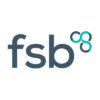- Latest quarterly Federation of Small Business (FSB) Small Business Index (SBI) finds majority of small firms expect no or negative growth in the next year
- Cost pressures and labour shortages are stymying investment plans and hampering economic development
- First fall in employee numbers for over a year recorded by small businesses
Hopes of a small business-led economic recovery from the pandemic may be under threat, according to the SBI report for Q2 2022 from FSB, which is published in full today.
The combined proportion of small firms who predict that they will stay the same size (38.7%) or downsize or even close their business (14.7%), at 53.4%, outweighs the 46.6% who predict they will grow in the coming 12 months.
The results differed by sector, with a better outlook for businesses in the information and communication sector, where 62.9% of businesses expected to grow in the next year, compared with only 33.9% of wholesale and retail firms, and 34.9% of hospitality sector businesses.
Small firms’ anaemic growth predictions coincided with the highest-recorded proportion of firms saying their costs are higher than a year ago, at 89.0%, and with the highest level of producer price inflation for four decades in June.
Fuel (cited by 64.2%) and utilities (63.5%) were the most-mentioned causes of this increase in costs, both up notably from the first quarter (60.1% and 58.0% respectively), and far higher than this time last year (Q2 2021: fuel cited as a cost increase factor by 25.9%, and utilities by 27.6%).
Of those businesses which expect to grow in the coming year, two thirds (65.1%) cite the domestic economy as a potential barrier to expansion, a figure which has risen from 58.6% in the Q1 report.
Lack of access to appropriately skilled staff was also noted as a significant worry, mentioned by 33.9% of businesses which expect to grow as a limiting factor. With ONS statistics showing there were 1.3 million vacancies in Q2, many firms are not able to find the staff they need, putting normal operations and usual opening hours – let alone plans to grow – in question.
Yet Q2 2022 also saw more small businesses reporting a fall in employee numbers than growing their payrolls, the first time this has happened since Q1 2021. One in ten small businesses (10.8%) grew their number of employees over the previous quarter, but were outnumbered by the one in seven (14.4%) who saw staff numbers fall over the same period.
More positively, a net balance of 7.2% of respondents anticipate that their employee base will increase in size in Q3, although this is around half the figure who predicted the same ahead of Q2 (14.5%), and many may find it tricky to get the people they need on board.
Martin McTague, FSB’s National Chair, said:
“The fall in GDP in the second quarter and the record-high inflation figures show the scale of what small businesses are up against, with our second quarter Small Business Index uncovering warning signs in many different indicators, from overall confidence to staff numbers and growth aspirations.
“Longer-term, those hopeful of solving the UK’s long-running productivity puzzle will not find much cause for cheer in this report, with small businesses held back from growing and investing by numerous factors.
“A healthy business ecosystem requires businesses of all sizes to be able to realise their ambitions – from one-person start-ups with a great idea, through the small and medium-sized businesses which form the bedrock of the economy, right up to the largest companies, who rely on countless smaller suppliers and service providers.
“With our research indicating that smaller firms’ intentions to grow are muted at best, with businesses planning to grow outnumbered by those expecting to stay the same size, shrink, or even close their business, a key driver of economic recovery is threatened.
“Inflation is higher than at any point for the last four decades, and is also acting as an inhibitor to investment – machinery, parts, software, tools, rents, and employment and operating costs in general are all increasing in price more rapidly than small businesses can run to keep up. It’s a toxic recipe for the future health of the economy.
“If the next Government wants to be able to level up the country, small business considerations must be at the heart of its thinking. Our members are looking for concrete help.”
FSB’s small business manifesto:
- A reversal of the recent rises in National Insurance
- A VAT cut, especially on energy bills
- An overhaul of the business rates system and an increase to £25,000 in the rateable value threshold for relief (in England)
- Help on energy prices for small businesses, by including them in the price cap, and offering relief via discretionary funding as well as through the business rates system
- A cut in fuel duty
- Making corporate boards directly accountable for late payments to suppliers, which put an untimely end to thousands of otherwise-viable small firms every year.
Ends
Notes to editors
1) FSB surveyed 1,306 small business owners and sole traders over June and July 2022.
2) The full SBI Q2 2022 report can be found here: fsb.org.uk/resource-report/sbi-q2-2022.html
Media contact
About FSB
As the UK’s largest business support group, FSB is the voice of the UK’s small businesses and the self-employed. Established over 40 years ago to help its members succeed in business, FSB is a non-profit making and non-party political organisation that’s led by its members, for its members. As the UK’s leading business campaigner, FSB is focused on delivering change which supports smaller businesses to grow and succeed.
FSB offers members a wide range of vital business services, including access to finance, business banking, legal advice and support along with a powerful voice in Government. Each year FSB also runs the UK’s Celebrating Small Business Awards. More information is available at www.fsb.org.uk. You can follow us on twitter @fsb_policy and on Instagram @fsb_uk.


